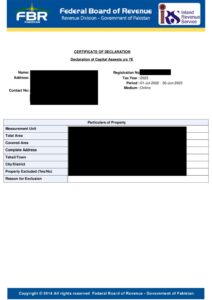Tax Filing Deadlines: Individuals vs. Companies
Section 118(2) Tax Filing Deadlines (Last Date For Income Tax Returns FBR in Pakistan) for Companies and Section 118(3) for Individuals/AOPs included:
Table of Contents
Tax Filing Deadlines: Individuals vs. Companies
| Filing Entity | Tax Year End Date | Filing Deadline | Wealth Statement Due Date |
|---|---|---|---|
| Salaried Individual / AOP | Any | On or before 30th September following TY end (Section 118(3)) | Same as filing deadline |
| Company | 1st January – 30th June | 31st December following TY end (Section 118(2)) | |
| Company | 1st July – 30th December | 30th September following TY end (Section 118(2)) |
Filing Returns with Ease:
For salaried individuals and Associations of Persons (AOPs), the process of filing returns couldn’t be simpler. Utilizing the user-friendly e-portal, individuals can conveniently submit their returns by the deadline—30th September following the conclusion of the Tax Year (TY) in question (as per Section 118(3)). This ensures a seamless filing experience, allowing individuals to fulfill their tax obligations efficiently.
Special Considerations for Companies Deadline:
Scenario 1: Tax Year Ends Between 1st January and 30th June
For companies with Tax Years concluding between 1st January and 30th June, the filing deadline is extended to 31st December of the subsequent year (as per Section 118(2)). This provides ample time for companies to compile their financial information and submit accurate returns, ensuring compliance with tax regulations.
Scenario 2: Tax Year Ends Between 1st July and 30th December
Conversely, for companies whose Tax Years end between 1st July and 30th December, returns must be filed by 30th September of the following year (as per Section 118(2)). Adhering to this deadline is essential for avoiding penalties and maintaining good standing with tax authorities.
Understanding these distinctions is crucial for companies to meet their tax obligations effectively and avoid unnecessary complications.
Mandatory Wealth Statements:
In addition to filing returns, it’s imperative for individuals to furnish Wealth Statements—a mandatory requirement under tax regulations. The due date for submitting Wealth Statements coincides with the date of furnishing the tax return, streamlining the process and ensuring comprehensive compliance.
Conclusion:
Navigating the intricacies of tax compliance can seem daunting, but with the right guidance, it becomes a manageable endeavor. Whether you’re an individual or a company, understanding the filing requirements and deadlines is paramount to maintaining compliance and avoiding unnecessary penalties. With my expertise and dedication, I’m here to guide you every step of the way, ensuring a smooth and stress-free tax season.
Thank you for joining me on this journey toward enhanced tax compliance. Stay tuned for more insightful articles and valuable tips to empower you on your tax journey!
This format provides clarity by breaking down the information for each scenario separately and includes the relevant sections of the tax code. Let me know if you need further adjustments!

Practice With Some Scenarios
Scenario 1: For Individuals/AOPs (Filing Deadline: On or before 30th September following TY end)
Practice Example:
Fatima, a salaried individual, wants to file his tax return for the tax year ending on June 30, 2023. When is the deadline for him to file his return?
Answer:
The deadline for Fatima to file his tax return for the tax year ending on June 30, 2023, is September 30, 2023. Salaried individuals must file their tax returns on or before September 30th following the end of the tax year. Therefore, Fatima should ensure his tax return is filed by September 30, 2023, to meet the deadline.
Scenario 2: Tax Year Ends Between 1st January and 30th June (Company Filing Deadline: 31st December following TY end)
Practice Example: ABC Corporation’s tax year ends on March 31, 2023. When is the deadline for filing its tax return?
Answer: The deadline for filing ABC Corporation’s tax return is December 31, 2023. Since their tax year ends on December 31st, they have until the end of the subsequent year to submit their tax return. Therefore, ABC Corporation must ensure its tax return is filed by December 31, 2023, to meet the deadline.
Scenario 3: Tax Year Ends Between 1st July and 30th December (Company Filing Deadline: 30th September following TY end)
Practice Example: XYZ Inc.’s tax year ends on September 30, 2023. What is the deadline for filing its tax return?
Answer: The deadline for filing XYZ Inc.’s tax return is September 30, 2024. Since their tax year ends between July 1st and December 30th, they must submit their tax return by the end of the following year’s September.

Frequently Asked Questions (FAQs) and Their Answers
FAQs and answers related to tax filing deadlines and compliance:
- What are the tax filing deadlines for individuals and companies?
- Answer: Tax filing deadlines vary based on the entity type. For salaried individuals and Associations of Persons (AOPs), the deadline is on or before September 30th following the Tax Year end, as per Section 118(3). Companies, on the other hand, have different deadlines based on their Tax Year end dates.
- How does the tax filing deadline differ for companies with Tax Years ending between January and June compared to July and December?
- Answer: For companies whose Tax Years conclude between January 1st and June 30th, the filing deadline is extended to December 31st of the subsequent year, as per Section 118(2). Conversely, companies with Tax Years ending between July 1st and December 30th must file their returns by September 30th of the following year, also as per Section 118(2).
- What are the consequences of missing the tax filing deadline?
- Answer: Missing the tax filing deadline can result in penalties and complications with tax authorities. It’s essential for both individuals and companies to adhere to the specified deadlines to avoid these consequences.
- Is filing a Wealth Statement mandatory along with tax returns?
- Answer: Yes, filing a Wealth Statement is mandatory for both individuals and companies, and the due date coincides with the tax return filing deadline. This ensures comprehensive compliance with tax regulations.
- How can individuals and companies file their tax returns with ease?
- Answer: Individuals and AOPs can utilize the user-friendly e-portal to conveniently submit their returns by the deadline. Companies must ensure they compile accurate financial information and submit their returns within the specified deadlines to maintain compliance.
- What are the key sections of the tax code that individuals and companies should be aware of regarding tax filing deadlines?
- Answer: Individuals should refer to Section 118(3) for their tax filing deadlines, while companies need to consider Section 118(2) for their specific deadlines based on their Tax Year end dates. Understanding these sections is essential for ensuring timely compliance with tax regulations.
- Are there any special considerations for companies with Tax Years ending between January and June versus July and December?
- Answer: Yes, companies with Tax Years ending between January 1st and June 30th have until December 31st of the subsequent year to file their returns, while those with Tax Years ending between July 1st and December 30th must file by September 30th of the following year. Adhering to these deadlines is crucial for avoiding penalties.
- What steps can individuals and companies take to prepare for tax filing season and ensure timely submission of returns?
- Answer: It’s essential for individuals and companies to maintain organized financial records throughout the year. Utilizing accounting software, keeping track of expenses and income, and staying informed about tax law changes can help streamline the tax filing process and prevent last-minute scrambling.
- What resources are available to help individuals and companies navigate tax filing requirements and deadlines?
- Answer: Individuals and companies can access online resources provided by tax authorities, consult with tax professionals or accountants, and participate in workshops or seminars to stay informed about tax filing obligations and deadlines.
- What are the benefits of timely tax filing and compliance for individuals and companies?
- Answer: Timely tax filing and compliance help individuals and companies avoid penalties, maintain good standing with tax authorities, and ensure accurate reporting of financial information. Additionally, it reduces stress and allows for better financial planning.
How Can I Help You?
- Return Filing Services:
- Whether you need assistance with individual or business returns, I’ve got you covered. Your returns will be prepared professionally and in accordance with Income Tax rules.
- Customized Solutions:
- Have specific requirements or unique situations? Let’s discuss your needs, and I’ll tailor my services to meet your individual circumstances.
Contact Options:
- YouTube Description:
- Find my number in the YouTube description and drop me a message. I’ll get back to you as soon as I’m available.
- Website:
- Visit my website and give me a call or leave a message. I’ll respond promptly to address your queries.
- WhatsApp:
- Prefer WhatsApp? Feel free to send me a message, and I’ll assist you as soon as I’m available.
Professional and Rule-Compliant Services: Rest assured that the services provided will be professional and adhere to Income Tax rules. Your peace of mind is my priority, and I’m committed to offering you the best solutions.
Feel free to reach out whenever you have questions or require assistance with your income tax matters. Looking forward to helping you navigate the world of taxation seamlessly! JazakAllah!


![Understanding Income Tax Filing Obligations: A Comprehensive Guide Sec [114]](https://taxpills.com/wp-content/uploads/2024/02/LimeWire-AI-Studio-Asset-15-1-150x150.jpg)





Pingback: A Step-by-Step Guide to Paying ATL 1,000 Challan - February
Pingback: Taxation on Conveyance Provided by Employer in Pakistan - 2024
Pingback: How to Get Your 7E Certificate from IRIS - March 15, 2024